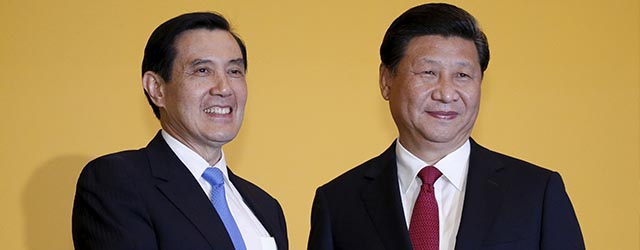Chinese president Xi Jinping met with Taiwanese president Ma Ying-jeou on November 7 in Singapore, the first time leaders from the two governments have come together since 1949.

There were no major deals or policy shifts, but the historic visit could yield political benefits for both men.
For current Taiwanese president Ma and his Kuomintang party (KMR), the meeting may boost political support domestically. His administration has pushed for closer relations with mainland China and has inked more than 20 economic agreements with Beijing. His critics say low-cost manufacturers in mainland China are damping wage growth in Taiwan. In fact, despite increased trade and investment with the mainland, Taiwan’s economy has grown slowly in recent years, and in the third quarter it contracted for the first time in six years, eroding support for Ma and the KMT. The opposition Democratic Progressive Party (DPP) will likely win the presidency and possibly control of the legislature in January.
“KMT supporters are using the meeting to show that only the KMT can deliver stability and prosperity with the mainland and to encourage voters to think harder about the potential downside risks of voting for the DPP,” says Dr. Michael Reilly, senior fellow at the China Policy Institute at the University of Nottingham. “To that extent, the meeting has been a success for the KMT, but it still has a lot of ground to make up.”
Chinese president Xi has an obvious incentive to help the pro-mainland KMT. But this meeting sets a precedent for future ones, regardless of party. And Xi’s risking blowback at home to meet with his Taiwanese counterpart will boost his support in the international community.
“Xi has shown that he’s willing to engage with Taiwan, which should help reassure the US and makes it less inclined to support Tsai [the DPP’s presidential candidate] if she wins and cross-strait relations deteriorate,” says Reilly.



